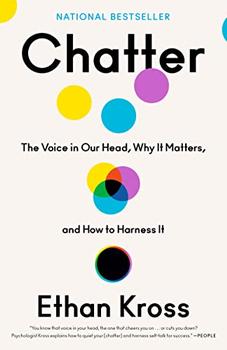Summary | Excerpt | Reading Guide | Reviews | Beyond the Book | Readalikes | Genres & Themes | Author Bio

Critics' Opinion:
Readers' Opinion:
First Published:
Jan 2021, 272 pages
Paperback:
Feb 2022, 288 pages
 Book Reviewed by:
Book Reviewed by:
Nichole Brazelton
Buy This Book
Chapter One
Why We Talk to Ourselves
The sidewalks of New York City are superhighways of anonymity. During the day, millions of intent pedestrians stride along the pavement, their faces like masks that betray nothing. The same expressions pervade the parallel world beneath the streets—the subway. People read, look at their phones, and stare off into the great invisible nowhere, their faces disconnected from whatever is going on in their minds.
Of course, the unreadable faces of eight million New Yorkers belie the teeming world on the other side of that blank wall they've learned to put up: a hidden "thoughtscape" of rich and active internal conversations, frequently awash with chatter. After all, the inhabitants of New York are nearly as famous for their neuroses as they are for their gruffness. (As a native, I say this with love.) Imagine, then, what we might learn if we could burrow past their masks to eavesdrop on their inner voices. As it happens, that is exactly what the British anthropologist Andrew Irving did over the course of fourteen months beginning in 2010—listened in on the minds of just over a hundred New Yorkers.
While Irving hoped to gain a glimpse into the raw verbal life of the human mind—or rather an audio sample of it--the origin of his study actually had to do with his interest in how we deal with the awareness of death. A professor at the University of Manchester, he had done earlier fieldwork in Africa analyzing the vocalized inner monologues of people diagnosed with HIV/AIDS. Unsurprisingly, their thoughts roiled with the anxiety, uncertainty, and emotional pain produced by their diagnoses.
Now Irving wanted to compare these findings with a group of people who surely had their woes but weren't necessarily in aggrieved states to begin with. To carry this out, he simply (and bravely!) approached New Yorkers on the street and in parks and cafés, explained his study, and asked if they would be willing to speak their thoughts aloud into a recording device while he filmed them at a distance.
Some days, a handful of people said yes; other days, only one. It was to be expected that most New Yorkers would be too busy or skeptical to agree. Eventually, Irving gathered his one hundred "streams of internally represented speech," as he described them, in recordings ranging from fifteen minutes to an hour and a half. The recordings obviously don't provide an all-access backstage pass to the mind, because an element of performance might have come into play for some participants. Even so, they offer an uncommonly candid window into the conversations people have with themselves as they navigate their daily lives.
As was only natural, prosaic concerns occupied space in the minds of everyone in Irving's study. Many people commented on what they observed on the streets--other pedestrians, drivers, and traffic, for example—as well as on things they needed to do. But existing alongside these unremarkable musings were monologues negotiating a host of personal wounds, distresses, and worries. The narrations often landed on negative content with utterly no transition, like a gaping pothole appearing suddenly on the unspooling road of thought. Take, for example, a woman in Irving's study named Meredith whose inner conversation pivoted sharply from everyday concerns to matters of literal life and death.
"I wonder if there's a Staples around here," Meredith said, before shifting, like an abrupt lane change, to a friend's recent cancer diagnosis. "You know, I thought she was going to tell me that her cat died." She crossed the street, then said, "I was prepared to cry about her cat, and then I'm trying not to cry about her. I mean New York without Joan is just ... I can't even imagine it." She started crying. "She'll probably be fine, though. I love that line about having a 20 percent chance of being cured. And how a friend of hers said, 'Would you go on a plane that had a 20 percent chance of crashing?' No, of course not. It was hard to get through, though. She does put up quite a wall of words."
Excerpted from Chatter by Ethan Kross. Copyright © 2021 by Ethan Kross. All rights reserved. No part of this excerpt may be reproduced or reprinted without permission in writing from the publisher.





The Flower Sisters
by Michelle Collins Anderson
From the new Fannie Flagg of the Ozarks, a richly-woven story of family, forgiveness, and reinvention.

The House on Biscayne Bay
by Chanel Cleeton
As death stalks a gothic mansion in Miami, the lives of two women intertwine as the past and present collide.

The Funeral Cryer by Wenyan Lu
Debut novelist Wenyan Lu brings us this witty yet profound story about one woman's midlife reawakening in contemporary rural China.
Your guide toexceptional books
BookBrowse seeks out and recommends the best in contemporary fiction and nonfiction—books that not only engage and entertain but also deepen our understanding of ourselves and the world around us.